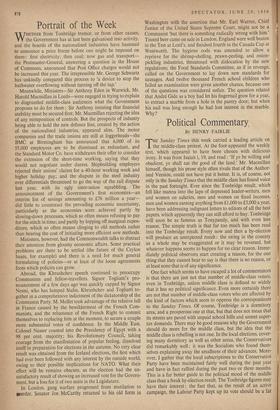Portrait of the Week
WHETHER from Tonbridge tremor, or from other causes, the Government has at last been galvanised into activity, and the boards of the nationalised industries have hastened to announce a price freeze before one might be imposed on them : first electricity; then coal; now gas and transport— the Pbstmaster-General, answering a question in the House of Commons, announced that Post Office charges would not be increased this year. The irrepressible Mr. George Schwartz has unkindly compared this process to 'a device to stop the bathwater overflowing without turning off the tap.'
Meanwhile, Ministers—Sir Anthony Eden in Warwick, Mr. Harold Macmillan in Leeds—were engaged in trying to explain to disgruntled middle-class audiences what the Government proposes to do for them : Sir Anthony insisting that financial stability must be secured first; Mr. Macmillan rejecting the idea of any reimposition of controls. But the prospects of industry being able to hold the new defence line, created by the action of the nationalised industries, appeared slim. The motor companies and the trade unions are still at loggerheads—the BMC at Birmingham has announced that 6,000 of its 55,000 employees are to be dismissed as redundant, and the Standard Motor Co. have withdrawn their offer to consider the extension of the short-time working, saying that they would not negotiate under duress. Shipbuilding employers rejected their unions' claims for a 40-hour working week and higher holiday pay; and the dispute in the steel industry over differentials threatened to go the way of the rail dispute last year, with its ugly inter-union squabbling. The announcement of the Government's first economies—an interim list of savings amounting to £76 million a year— did little to counteract the prevailing economic uncertainty, particularly as the economies were achieved partly by slowing-down processes, which so often means refusing to pay for the stitch in time; and partly by lopping off marginal expen- diture, which so often means clinging to old methods rather than bearing the cost of initiating more efficient new methods.
Ministers, however, had the Commonwealth talks to distract their attention from gloomy economic affairs. Some practical problems are there to be settled (the future of the Ceylon bases, for example) and there is a need for much general formulating of policies—or at least of the loose agreements from which policies can grow.
Abroad, the Khrushchev speech continued to preoccupy Communists and fellow-travellers. Signor Togliatti's pro- nouncement of a few days ago ' was quickly capped by Signor Nenni, who has lumped Stalin, Khrushchev and Togliatti to- gether in a comprehensive indictment of the dictatorship of the Communist Party. M. Mollet took advantage of the relative lull in France caused by the bewilderment of the French Com- munists, and the reluctance of the French Right to commit themselves to replacing him at the moment, to secure a couple more substantial votes of confidence. In the Middle East, Colonel Nasser coasted into the Presidency of Egypt with a 98 per cent. majority; his Revolutionary Council, taking courage from the manifestation of popular feeling, dissolved itself in preparation for elections in the autumn. No very clear result was obtained from the Iceland elections, the first which had ever been followed with any interest by the outside world, owing to their possible implications for NATO. What their effect will be remains obscure, as the election had the un- satisfactory result of showing an increased vote for the Govern- ment, but a loss for it of two seats in the Legislature.
In London, gang warfare progressed from mutilation to murder. Senator Joe McCarthy returned to his old form in Washington with the assertion that Mr. Earl Warren, Chief Justice of the United States Supreme Court, might not be a Communist tut there is something radically wrong with him.' Tinned beer came on sale in London. England were well beaten in the Test at Lord's, and finished fourth in the Canada Cup at Wentworth. The hygiene code was amended to allow a reprieve for the shrimp-shelling, prawn-peeling, and onion- pickling industries, threatened with dislocation by the new regulations; the Food Standards Committee, as if in revenge, called on the Government to lay down new standards for sausages. And twelve thousand French school children. who failed an examination were given another chance, because one of the questions was considered unfair. The, question related that Andre Gide as a boy had let his fingernail grow for a year, to extract a marble from a hole in the pantry door; but when his nail was long enough he had lost interest in the marble. Why?


































 Previous page
Previous page